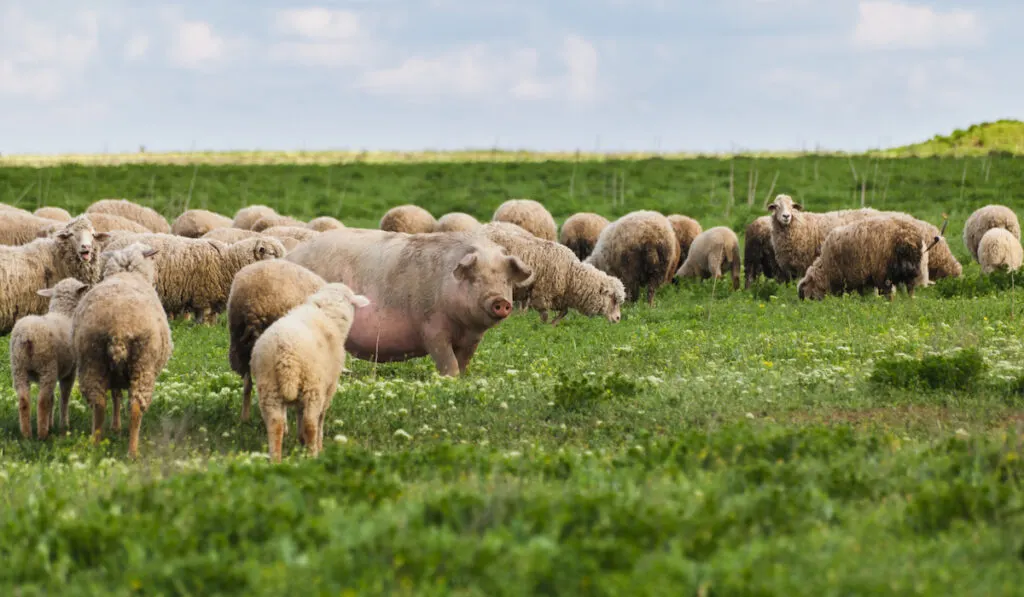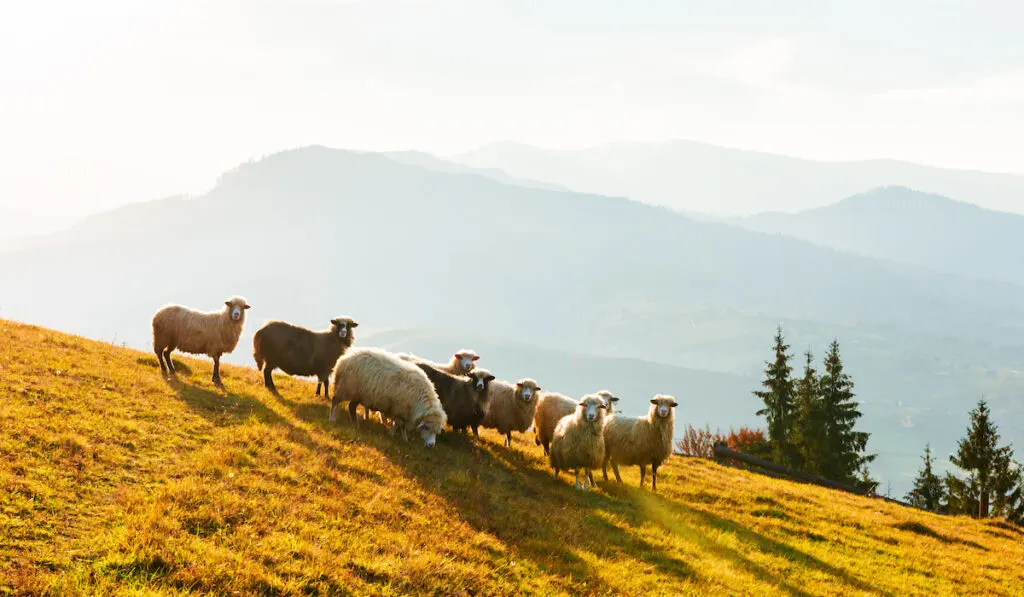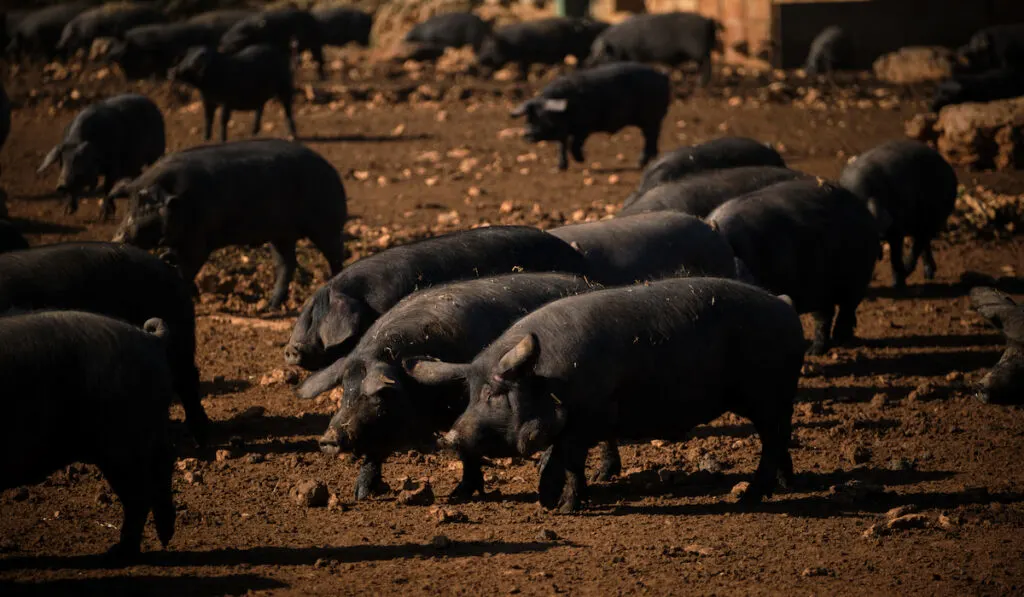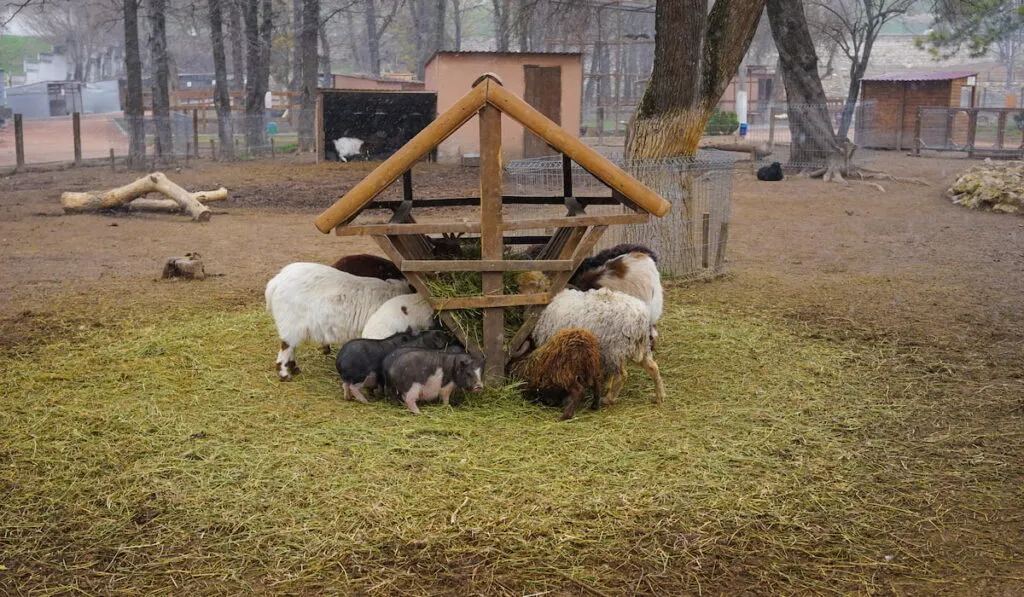Raising multiple species of farm animals is doable; in fact, it’s encouraged. There are many benefits to raising farm animals together.
Sheep and pigs, along with cows and goats, are ruminants. A ruminant is an herbivorous animal that chews its food once, swallows, regurgitates, and then chews it a second time. Raising different ruminants together keeps your land and animals healthy. It can also help reduce costs.
Can sheep and pigs live together?
Sheep and pigs are different in character but can live together if proper measures are in place. You can raise sheep and pigs without fencing if you have a massive piece of land.
Each animal will have enough space to roam and graze. For absolute peace of mind, though, it is better to install fencing.
That said, sheep and pigs should sleep and eat separately if the farm is small or in your backyard. You can rotate their pastures every few months.

Pigs are aggressive and regularly hurt other animals. Pigs are also very sexual creatures and attack other animals thinking it’s a fellow pig.
They also tend to dig up foliage that sheep eat when confined. A decently sized piece of land with good fencing will leave both animals feeling happy and safe.
Remember, sheep and pigs can never sleep in the same place, and if you’re feeding them in addition to letting them graze, they can’t eat together either. Never let your pigs near birthing zones, even if you have a large piece of land.
What Are the Pros and Cons of Sheep and Pigs Living Together?
Sheep and pigs are awesome. They can live together quite contently. There are several pros and cons to sheep and pigs living together.
The Pros
- You can keep more animals on the same land for a similar length of time as a single animal.
- Sheep and pigs eat different grasses and brushes. You can rotate their pastures easily.
- You will save on water and electricity by keeping sheep and pigs in one location with secure fencing. Remember that the water source can be the same, but sheep and pigs need separate drinking areas.
- It creates healthy, fertile land. Sheep are nature’s weed eaters, and pigs dig up the roots with their snouts, creating a healthy eco-system for your farm.
- All ruminants graze on different areas of the land, so they aren’t as helpful when raised individually.
- Your farm will be more productive because you’ll waste less time and money on harmful solutions to problems like weeds. You can put more energy into planning efficient rotation regimes that keep the animals happy and your farm arable.
The Cons
- Pigs are aggressive and can harm your sheep. They also aren’t easy to train and often escape enclosures with inadequate fencing.
- You will need a strict parasite program to ensure your pigs and sheep don’t pass them back and forth. It is costly and time-consuming.
- Sheep are prone to headbutting, which pigs interpret as aggression. They attack the sheep, so ensure you stop headbutting behaviors before they become habits.
- Logistical issues can be a problem if you don’t have the right amount of space for both animals.
There are more pros to raising sheep and pigs together.
While there is a little work required in setting up a multi-species operation, it’s better for your animals and the land. Plus, maintenance is relatively easy once you establish everything.
What Do Sheep and Pigs Need to Live Happily?
You must understand the needs of each animal before setting up spaces for them to live. Your animals will be much happier if you keep their individual needs in mind.

Sheep
Sheep are great animals to raise on small farms or in your backyard. They are gentle and easy to manage when compared with other farm animals.
Sheep are trainable. You can use treats to teach them to follow you or even stand up. They don’t require large amounts of land. Their manure is excellent for the soil and creates beautifully fertile farming land. But what do sheep need to live happy, healthy lives?
- Food – Healthy sheep need a good balance of pasture grasses, salt, and water. Sheep also need a vitamin and mineral supplement that meets their specific needs. They require more protein than other ruminants, so you must give them grain supplements if your pastures aren’t fertile enough. Try to raise the feeding trough as this will keep their eating area clean and free from bacteria and parasites.
- Shelter – Sheep need little protection from wind and rain, especially while sleeping. The ideal structure is a three-walled shed. It should face south and give each sheep around 15 – 20ft² of space. It’s a good idea to make it out of light material, that way you can move it to a new pasture whenever necessary.
- Of course, when sheep give birth in the winter or spring, it’s best to leave the ewe in a sturdy structure with complete protection from the elements.
- Fencing – Smooth-wire electric fences are best for sheep. You can also use woven, non-electric wire fencing if you prefer no current running through them.
- Pasture Necessities – Sheep need shade during summer because their wool makes them overheat in summer. They also need access to a large body of fresh water. It’s vital to keep your animals hydrated. Make sure the pasture has good grasses for the sheep to eat.

Pigs
Pigs are a little trickier to manage than sheep. They are more aggressive and aren’t easy to train.
Pigs have strong personalities, which is one of the reasons they are so fun to raise. They are prone to breaking fences and running away.
Pigs are very sensitive to their environment, so you must ensure you create a space that supports healthy living.
- Food – Although we commonly see pigs eating scraps and meat, it’s not ideal for them. Pigs require a plant diet. They should get protein from eggs or their feed. The best foods for pigs that live in a barn are vegetables, such as corn, broccoli, and lettuce, and a pig feed that contains at least 18% protein. Pigs living in pastures can thrive on grasses and brush but must have their protein supplemented with pig feed. They also need fresh water.
- Shelter – Pigs, much like sheep, don’t need a lot of protection. A three-sided structure is sufficient to protect them from the sun, wind, and rain on small-scale and backyard farms. Lay the ground with straw. It helps absorb any excrement and smells.
- Fencing – Pigs are notorious for breaking free from enclosures. The best fencing for pigs is electric.
- Pasture Necessities – Pigs are prone to sunburn, so they must have many shaded areas to rest in during the day. They also need access to a large quantity of drinking water.
Now it’s easier to see how you can make a safe and secure space for sheep and pigs. Keep these spaces secure with good fencing. You can have them next to one another.
However, all feeding, birthing, and sleeping areas must be kept separate.
If you have a massive piece of land, you can get away with keeping sheep and pigs together without fencing, but it still carries a small risk. The correct fencing, housing, and shade will create a happy environment for sheep and pigs to live together.
How Do You Manage Sheep and Pigs Living Together?
It’s not always easy to create a multi-species farm. Sheep and pigs can live together with the right conditions. Seven Sons Farms created this awesome video to show their solutions.
Frequently Asked Questions
What Other Animals Can Live With Sheep and Pigs?
Sheep and pigs can live with other ruminants like goats and cows. Again, it’s best to keep their sleeping and eating areas separate. They can graze together if your farm is large enough; although, a fence will make your life easier.

Can Sheep and Pigs Sleep Together?
No, sheep and pigs should have separate sleeping and eating areas. While they need similar sleeping arrangements, pigs are more aggressive and restless than sheep.
They might hurt your sheep in the night. Pigs also need a pool or mud pit in their sleeping areas. Sheep get too dirty and uncomfortable in such conditions.
Things to Remember
The most important thing to remember is fencing. Sheep and pigs will happily live together if they have their own space. They must sleep and feed in different areas, too. Both sheep and pigs need plenty of water and shade.
Final Thoughts
Sheep and pigs are entertaining animals that are very different. Sheep are docile and trainable, while pigs are aggressive and mischievous. They can live together if you take the necessary precautions. They will make your land fertile and healthy if raised together.
Resources:
- https://www.hobbyfarms.com/pigs-pasture-other-livestock-chickens-cattle-sheep-goats/
- https://familyfarmlivestock.com/raising-farm-animals-together-what-works-and-what-doesnt/
- https://opensanctuary.org/article/how-pigs-get-along-with-other-species/
- https://epicprovisions.com/blogs/land-livestock/multi-species-operations
- https://onpasture.com/2014/12/29/managing-multi-species-grazing/
- https://www.treehugger.com/how-to-raise-sheep-3016859
- https://www.farm4trade.com/raising-pigs-a-pig-farming-guide-for-beginners/
- https://morningchores.com/keeping-pigs-cool/
- https://www.youtube.com/watch?v=oy1Qw6PhtWo&ab_channel=MarketJournal
- https://www.youtube.com/watch?v=CRMmVx4aKSA&ab_channel=WallaceCenter
- https://www.youtube.com/watch?v=u89GCGSDimA&ab_channel=SevenSonsFarms

